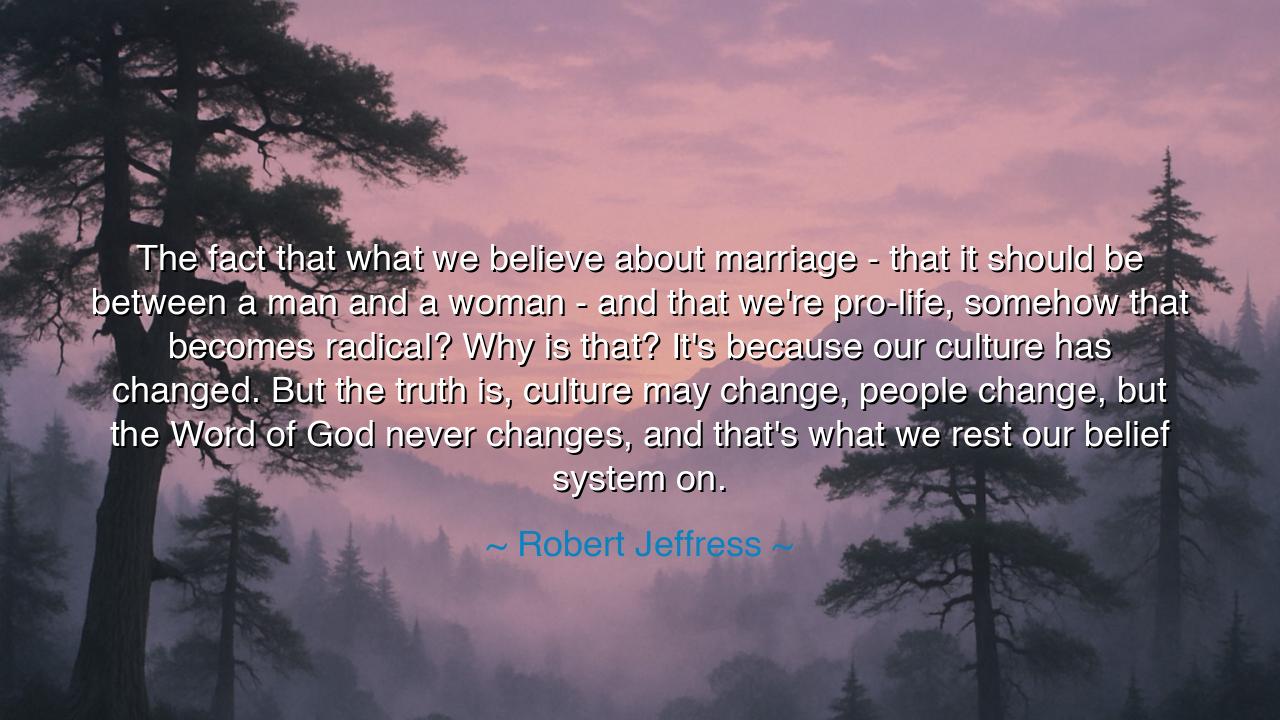
The fact that what we believe about marriage - that it should be
The fact that what we believe about marriage - that it should be between a man and a woman - and that we're pro-life, somehow that becomes radical? Why is that? It's because our culture has changed. But the truth is, culture may change, people change, but the Word of God never changes, and that's what we rest our belief system on.






In the solemn and unwavering tone of the preacher Robert Jeffress, there echoes a voice that stands against the tide of time: “The fact that what we believe about marriage — that it should be between a man and a woman — and that we're pro-life, somehow that becomes radical? Why is that? It's because our culture has changed. But the truth is, culture may change, people change, but the Word of God never changes, and that's what we rest our belief system on.” These words rise like a bastion in an age of shifting sands, a declaration that there remains an eternal foundation amid the storms of opinion and progress. Jeffress speaks not merely of belief, but of authority, of a higher truth that transcends the fragile logic of human fashion.
At the heart of this quote lies the ancient struggle between eternal truth and temporal change. The speaker mourns the modern inversion—where what was once regarded as sacred and normal now stands branded as extreme. To him, the world’s moral compass has turned upon itself. In this lament, one can hear the echo of the prophets who cried to Israel, “You call good evil and evil good.” Jeffress does not speak against culture’s evolution of form—its art, its invention, its speech—but against its loss of anchor. When he declares that “the Word of God never changes,” he is calling the people back to the unchanging center, to the scriptural root that nourishes moral order.
To understand his conviction, we must turn to the Book of Genesis, to the moment where man and woman were first joined by divine decree. In that union, believers find not merely romance, but covenant—a mirror of God’s faithfulness to His creation. Jeffress’s point is that when this sacred design is reinterpreted to fit human desire, the structure of moral order begins to erode. This belief is not new, nor is it unique to his generation. It has been the refrain of faith leaders across millennia, each facing their own age of moral confusion, where what is right by Heaven becomes strange to the earth.
Consider the story of Saint Athanasius, who in the fourth century stood alone against the world’s changing theology. When all of Christendom drifted toward the Arian heresy—denying the divinity of Christ—Athanasius refused to bend. They mocked him, exiled him, silenced him, yet he answered, “Athanasius contra mundum”—Athanasius against the world. For he believed that truth was not determined by consensus but by the unchanging Word of God. His defiance preserved the creed that millions now hold as cornerstone. Likewise, Jeffress’s words reflect this same ancient courage—to stand for the eternal even when the multitude moves with the winds.
But there is also tenderness in his message, for when he says, “culture may change, people change,” there is recognition that humanity is restless, always searching for meaning. Culture shifts because people hunger for belonging; yet when it abandons truth, that hunger deepens into emptiness. Jeffress’s warning, then, is not merely about marriage or morality—it is about identity. A culture without divine anchor forgets who it is. It begins to craft truth in its own image, and in doing so, loses its reflection of the Creator.
Still, his message is not one of despair, but of steadfastness. He calls the faithful to stand not with pride, but with peace—to live by conviction, not condemnation. For if the Word truly never changes, then it needs no defense of violence, only the witness of endurance. To rest one’s belief upon the eternal Word is to build a house upon the rock, while others build upon sand. The rains of ridicule will fall, but the house will stand. The fire of mockery may burn, but the gold of conviction shines brighter for it.
Thus, O listener of truth, take this lesson deeply into your heart: do not measure your beliefs by the fashions of your age. For ages pass, but truth abides. If you believe in something eternal—stand upon it with humility and courage. Let your convictions be kind but unyielding; your faith, firm but compassionate. Whether you stand among many or few, remember that righteousness is not determined by applause, but by alignment with the eternal Word.
And in the end, when the noise of culture fades like smoke and the monuments of men crumble into dust, one truth shall remain: “The Word of God never changes.” It is the same yesterday, today, and forever. Let that truth be your compass, your refuge, and your song in every changing age.






AAdministratorAdministrator
Welcome, honored guests. Please leave a comment, we will respond soon